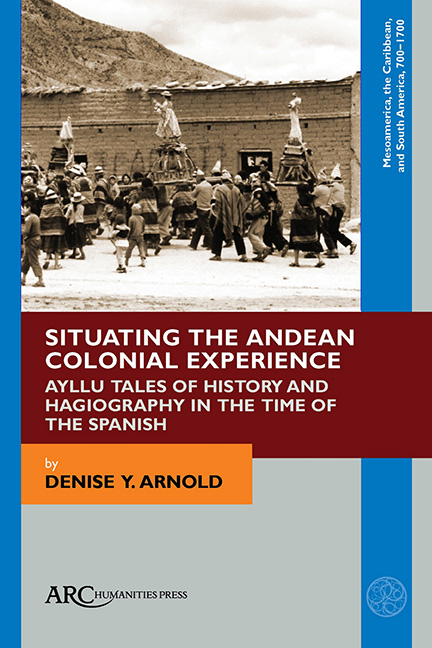 Situating the Andean Colonial Experience
Situating the Andean Colonial Experience Book contents
- Frontmatter
- Contents
- List of Illustrations
- Note About the Spelling of Toponyms and Proper Names
- Acknowledgements
- Maps
- Introduction
- PART ONE THE ORAL HISTORY OF QAQACHAKA
- PART TWO THE COLONIAL CACIQUES IN ORAL AND WRITTEN HISTORY
- PART THREE QAQACHAKA MARKA
- PART FOUR THE SAINTS APPEAR
- PART FIVE THE RELIGIOUS PRACTICES OF QAQACHAKA MARKA
- Some Conclusions
- Glossary
- Appendix A Document C of Don Franco Quispe Maraza
- Appendix B Document K of Don Franco Quispe Maraza
- Bibliography
- Thematic Index
- Index of Toponyms
- Frontmatter
- Contents
- List of Illustrations
- Note About the Spelling of Toponyms and Proper Names
- Acknowledgements
- Maps
- Introduction
- PART ONE THE ORAL HISTORY OF QAQACHAKA
- PART TWO THE COLONIAL CACIQUES IN ORAL AND WRITTEN HISTORY
- PART THREE QAQACHAKA MARKA
- PART FOUR THE SAINTS APPEAR
- PART FIVE THE RELIGIOUS PRACTICES OF QAQACHAKA MARKA
- Some Conclusions
- Glossary
- Appendix A Document C of Don Franco Quispe Maraza
- Appendix B Document K of Don Franco Quispe Maraza
- Bibliography
- Thematic Index
- Index of Toponyms
Summary
IN THIS BOOK, I have tried to escape from the neutral language of a history “from nowhere” (sensu Haraway), in which an authorized voice insists that the colonial period in the Andes was a syncretic and hybrid reconfiguration, a mestizo mutation in which a medley of all the elements resulted in a new postcolonial configuration, whether in the new religion or the new institutions and ideas circulating around this. My argument has been that the experience of history always has its point of view and is situated in a specific locality, in this case, Qaqachaka. And from that specific locality with its specific group of inhabitants, as Ariel Morrone observes, this “dynamic back and forth between the old and the new is not limited to a mere juxtaposition of cultural elements” (2010, 229).
With this concern, I sought to remedy the frequent absence in studies about the Colony of the point of view of the populations from the region, and, besides, in their own languages. We have the accounts by the conquistadores and the chroniclers, the observations of religious men and travelling men, and some exceptional voices in Quechua from the beginning of the Colony captured incidentally, as part of the programme of extirpation of idolatries, in the Ritos y Tradiciones de Huarochirí. We also have the great work of the Nueva corónica y buen gobierno attributed to Guaman Poma de Ayala (but probably linked to a neo-Inka Jesuit movement of the times), in which his moralizing voice (with fragments in Aymara) criticizes relentlessly the nefarious aspects of the New World he was experiencing. And we have more that a century of academic studies on many facets of colonial life (Pease, Assadourian, Bethell, Brading, Bakewell, Barnadas, Duviols, Thurner, Querejazu, Platt, Bouysse-Cassagne, and Harris, Tandeter, Presta, Medinacelli, Barragán, to name a few), even though many of these works tend to present their case from another point of view. More recently, the locally focused studies of Taller de Historia Andina (THOA) in the 1980s, Thomas Abercrombie in the 1990s, followed by Gonzalo Lamana, Sinclaire Thompson, and others, have opened the way to a the new generation of scholars (Alber Quispe, Vincent Nicolás, Paula Zagalsky, Ariel Morrone, and others), who take up this challenge with new questions and answers.
- Type
- Chapter
- Information
- Situating the Andean Colonial ExperienceAyllu Tales of History and Hagiography in the Time of the Spanish, pp. 323 - 330Publisher: Amsterdam University PressPrint publication year: 2021


